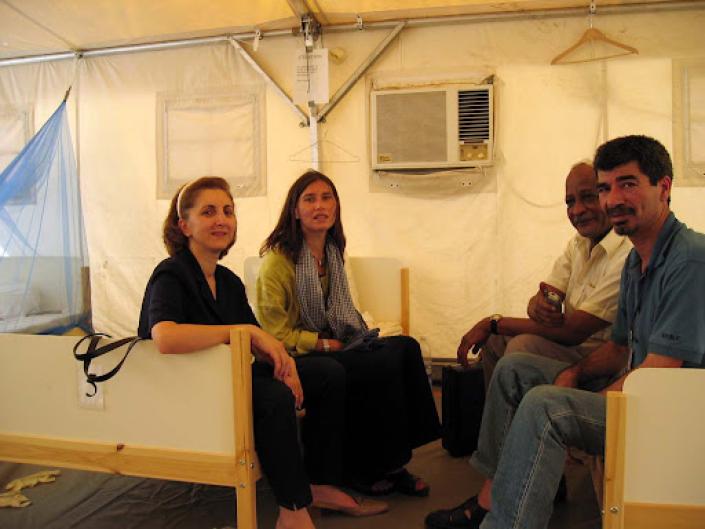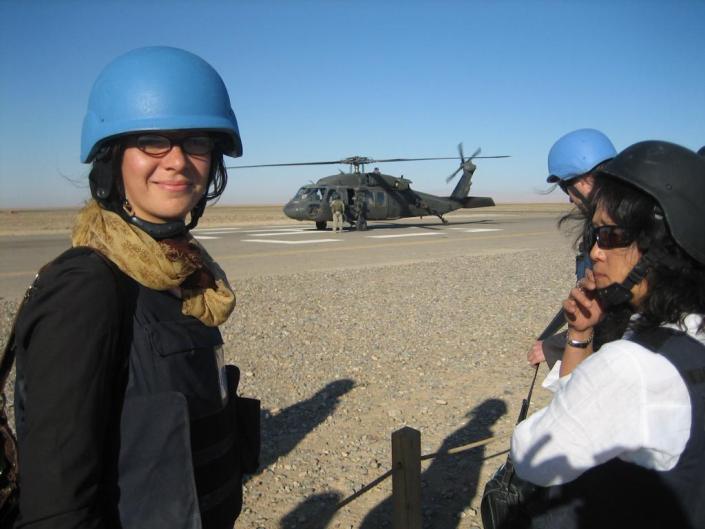We stand shoulder to shoulder with the communities we serve No Matter What.
No matter the danger
No matter the hardship
No matter the blood
sweat
tears
No matter the politics
No matter the hostility
No matter the race
religion
creed
Because
What matters isn’t what side you’re on
What matters is that we’re by your side
What matters isn’t our differences
What matters is that we make a difference
We are here for one reason only,
To help
No matter who
No matter where
No matter what
World Humanitarian Day 2023
#NoMatterWhat
On 19 August 2003, we lost 22 colleagues in an attack on the United Nations in Baghdad, Iraq. The tragedy profoundly changed the way in which humanitarians operate – from being respected, to being targeted – and led to the creation of World Humanitarian Day (WHD).
Today, 20 years on, our work has grown in scale and complexity. We aim to help almost 250 million people – 10 times more people than in 2003.
As our efforts have grown, so to have the challenges we face. From rising geopolitical tensions and the blatant disregard of international humanitarian law, to deliberate attacks and disinformation campaigns, our work is more difficult and dangerous than ever.
Amid these trials we have grown stronger, and we are closer to the women, men and children we serve. We venture deep into disaster-stricken regions and closer to the front lines of conflict with no other purpose than saving and protecting lives and delivering the basics of life: food, water, shelter, education, health, nutrition and protection.
On this WHD, we will reaffirm our commitment to the values and humanitarian principles that guide us and show that we stand shoulder to shoulder with the communities we serve, no matter who, no matter where and #NoMatterWhat.
Survivor Testimonials
Survivors of the 2003 Canal Hotel Bombing reflect on the tragedy and WHD.
Shawbo Taher-Al-Talabani
"The attack may have changed my personal opinion and philosophy of life, but it did not change my belief in humanitarian action and the necessity and importance of our organization’s work in all fields. [...] I left Iraq with a heart full of grief for a country where we were unable to accomplish our noble mission, and for friends we unjustly lost."
Laura Dolci
The 19 August is engraved in every cell of my body. It is part of me and the life of our family. It means a child who grew up without knowing his father. That 2-ton bomb brutally maimed our family, but we held together, inspired by Jean-Selim's sacrifice, and we carried on, giving meaning to our existence and holding high the values of humanity and justice, at home and at work.
Khaled Mansour
"I was very angry at the UN, at the stupid, murderous terrorists, and probably ultimately at myself for having survived while 22 others did not. This is what I found out through months and years of psychotherapy and self-reflection. [...] Looking back at what happened, I still feel sad at the huge loss of lives and potential, but I have also learned a great deal."
Mujahed Hasan
"The attack continues to hold great significance for me and my work. It serves as a constant reminder of the sacrifices made by humanitarian workers worldwide. The attack reinforced the importance of our mission and the need to persevere in the face of adversity. It strengthened my commitment to making a positive difference in the lives of others, and it drives me to continue working towards a more compassionate and resilient society."
Elpida Rouka
Canal will always serve as a reminder, albeit a tragic one, of what the UN blue flag [...] represents or must represent. [The colleagues we lost that day] embodied the spirit of the UN flag – defying risk, rising above politics, speaking up for those whose voices were silenced, talking truth to power, challenging more powerful groups when those are wrong, pushing against all odds and going back.
Jason Pronyk
"[The] bombing on the Canal Hotel fundamentally changed me as a person. [...], physically and psychologically, with lifelong injuries, you bear the scars, loss of functions and restricted abilities. [...] I remain convinced the responsibilities of the UN and humanitarians are as relevant if not more today than on that desperate, sweltering August day that tore lives and families apart."
Partner Resources
The best way to join the campaign is to share (and create your own) #NoMatterWhat content.
Everything you need is available – from social media and digital assets to suggested messaging.
What is World Humanitarian Day?
On 19 August 2003, a bomb attack on the Canal Hotel in Baghdad, Iraq, killed 22 humanitarian aid workers, including the UN Special Representative of the Secretary-General for Iraq, Sergio Vieira de Mello. Five years later, the General Assembly adopted a resolution designating 19 August as World Humanitarian Day (WHD).
Each year, WHD focuses on a theme, bringing together partners from across the humanitarian system to advocate for the survival, well-being and dignity of people affected by crises, and for the safety and security of aid workers.
For this year’s WHD, we show that we stand shoulder to shoulder with the people we serve, no matter who, no matter where and #NoMatterWhat.
World Humanitarian Day is a campaign by the United Nations Office for the Coordination of Humanitarian Affairs (OCHA).


.jpg%3Fitok=SdvA2a5b)
.jpeg%3Fitok=Jwlbye5A)
_0.jpg%3Fitok=hH0Ah7kB)

 with US Col. (ret.) Rocco Armonda, who led the neurosurgery unit at the US Combat Support Hospital in Baghdad. He was the first surgeon to operate on Jason. (2).jpg%3Fitok=m8AaxIvg)